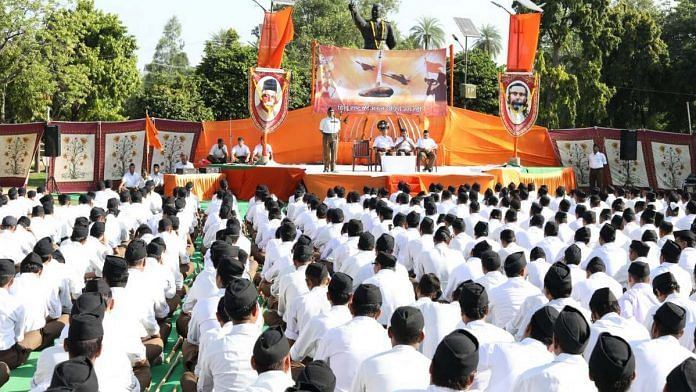
New Delhi: The Rashtriya Swayamsevak Sangh (RSS) is planning to set off a debate and create awareness on the issue of population control to address the country’s demographic imbalance.
One of the key causes of concern for the RSS is the country’s demographic imbalance, especially in Northeastern states and border areas, where it has affected the socio-cultural fabric and their security.
The RSS’ stand on the issue is clear and remains unchanged since 2015 when it had passed a resolution, urging the government to “reformulate the National Population Policy keeping in view availability of resources in the country, future needs and the problem of demographic imbalance and apply the same uniformly to all”.
The organisation is, however, cautious as it knows there could be attempts to create rumours that the move to reformulate the population policy is aimed at checking the growth of the Muslim population.
The RSS will, therefore, first initiate a national debate on this issue to create awareness on it.
This apart, the RSS will focus more on disseminating correct information and facts on the issue of population control following the protests across the country over the Citizenship Amendment Act (CAA) and National Register of Citizens (NRC) due to lack of information.
On Sunday, RSS chief Mohan Bhagwat said in Uttar Pradesh’s Bareilly that a policy should be in place to deal with the problem of population. “I had only said the population growth is a problem as well as a resource. So a required policy should be drafted. This policy will decide how many kids one should have,” he said.
Also read: RSS-BJP’s new plan for Kashmir — prop up Maharaja Hari Singh as a nationalist
BJP to take more time to pursue the issue
While the RSS has decided to initiate the debate on population control, the Bharatiya Janata Party (BJP), it’s ideological mentee, may take some more time to pursue the issue as it’s waiting for the heat over the CAA and the NRC to dissipate.
With the next census scheduled in 2021, it seems to be an opportune moment for the BJP to take up this debate at the national level.
According to the RSS’ initial assessment, most political parties are likely to support the issue of population control the way they did when Article 370 was scrapped in Jammu and Kashmir in August last year.
Also read: RSS man holds ‘shakha’ on Everest, flies pro-CAA banner on highest peak outside Asia
What the 2015 resolution stated
According to RSS functionaries, the organisation’s stand on the issue has been clearly laid down in the 2015 resolution passed in October at its Akhil Bharatiya Karyakarini Mandal (ABKM), one of the key decision-making bodies of the RSS.
The resolution titled ‘Challenge of Imbalance in the Population Growth Rate’ passed by the AKBM said, “….the severe demographic changes brought forth by the analysis of the religion data of Census 2011 highlights the necessity of the review of population policy.
“Vast differences in growth rates of different religious groups, infiltration and conversion resulting in religious imbalance of the population-ratio, especially in border areas may emerge as a threat to the unity, integrity and cultural identity of the country,” it added.
“…the National Fertility and Health Survey [NFHS] of 2005-6 and the 0-6 age group population percentage data of religion in Census 2011, both indicate that the TFR and child ratio is uneven across the religions. This is reflected in the fact that the share of population of religions of Bharatiya origin which was 88 per cent has come down to 83.8 per cent while the Muslim population which was 9.8 per cent has increased to 14.23 per cent during the period 1951-2011,” the resolution said.
“In addition to that, the rate of growth of Muslim population has been very high than national average, in the border districts of border states of the country like Assam, West Bengal and Bihar, clearly indicating the unabated infiltration from Bangladesh,” it said.
“The Report of the Upamanyu Hazarika Commission appointed by Hon. Supreme Court and several judicial pronouncements from time to time have also corroborated these facts.
“It is also a fact that the infiltrators are usurping the rights of citizens of these states and are becoming a heavy burden on the already scant resources apart from creating socio-cultural, political and economic tensions,” said the resolution.
With specific focus on Northeastern states, the resolution highlighted the link between demographic imbalance and religious conversions.
“The religious imbalance of population in the Northeastern states has assumed serious proportions. In Arunachal Pradesh, the people of religions of Bharatiya origin were 99.21 per cent in 1951. It came down to 81.3 per cent in 2001 and to 67 per cent in 2011. In just one decade the Christian population of Arunachal Pradesh has grown by almost 13 percentage points. Similarly, in the population of Manipur, this share of religions of Bharatiya origin which was more than 80 per cent in 1951 has come down to 50 per cent in 2011.
“These examples and pointers of unnatural growth of Christian population in many districts of the nation indicate an organised and targeted religious conversion activity by some vested interests.”
The RSS’ stand on all these issues remains unchanged and it believes that there would largely be a national consensus on this that would prod the present government into formulating an effective National Population Policy.
(The writer is CEO of Indraprastha Vishwa Samvad Kendra and author of two books on the RSS. The views expressed are personal).
Also read: RSS leader wants India’s economic policy to be drawn from Hindu religious texts

Any one give a rats ass of RSS thinking?????
Fertility is below replacement level in several developed states like Kerala. Population growth is essentially a problem in the cow belt, which is least equipped to do justice to the demographic dividend. The subliminal message, however, remains that Muslims have four wives – an impossibility, given the sex ratio – and breed prolifically.